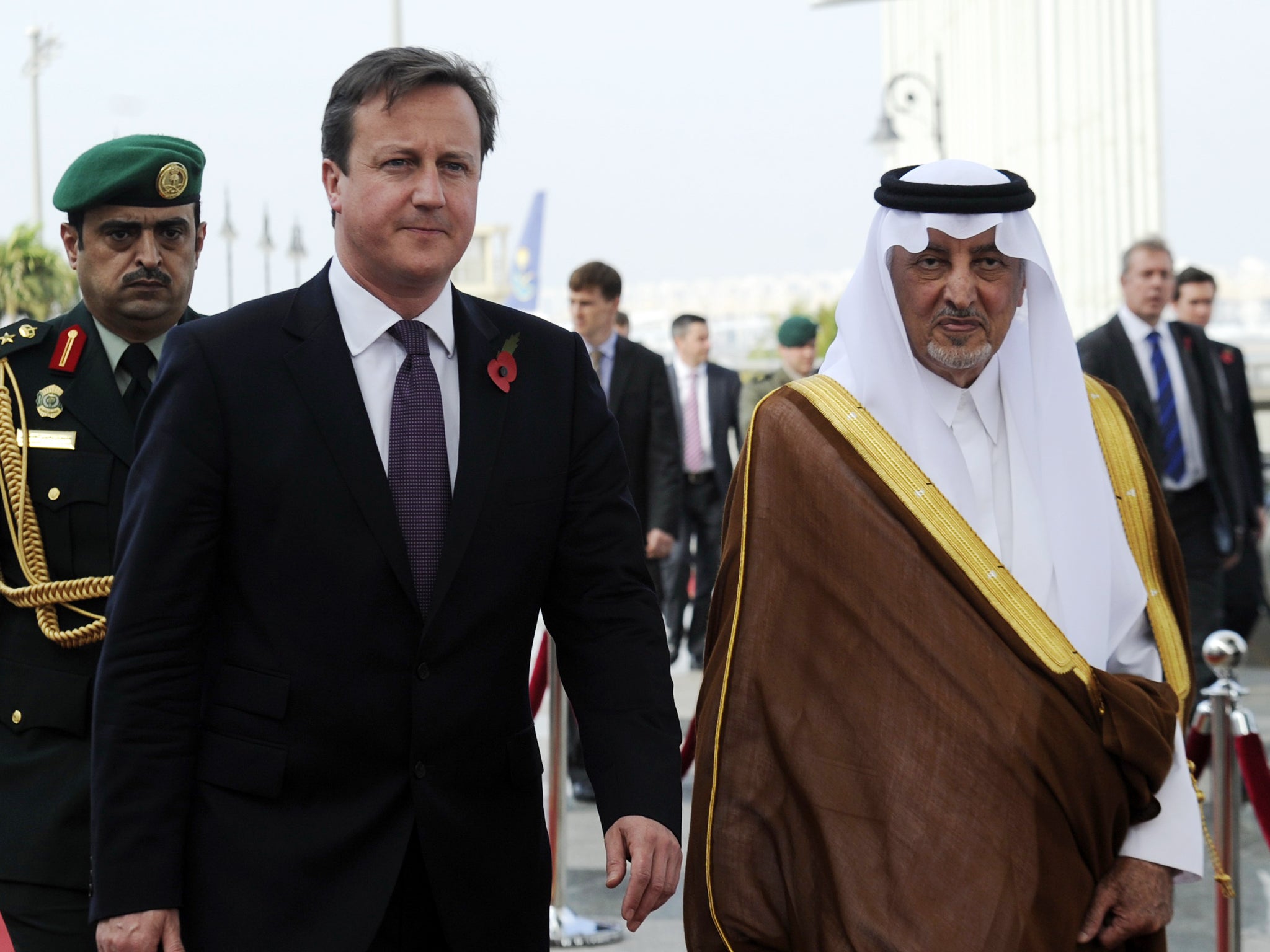UK arms sales to Saudi Arabia 'worth £5.6bn under David Cameron'
Campaign Against Arms Trade claims the UK has sold weapons to 24 'countries of humanitarian concern' since May 2010

The Conservative government has licenced £5.6bn in sales of arms, fighter jets and other military hardware to Saudi Arabia since David Cameron came to power, campaigners have claimed.
New research by the Campaign Against Arms Trade (CAAT) states that in the nearly six years since Mr Cameron’s election in May 2010, the UK has sold weapons to 24 of the 27 states included on its own list of “countries of humanitarian concern”.
The deals come alongside over £2bn in sales to other countries accused of abusing of human rights.
Of the countries on the list, only North Korea, Iran and Cuba have not benefited from government-issued arms licences.
All of the other 24 have been licenced to make deals with British companies, from Saudi Arabia’s ongoing purchase of 72 Eurofighter Typhoon aircraft (which will be worth a total of £4.5bn upon completion) right down to Eritrea’s solitary £8,600 purchase of body armour. Overall, these deals are worth £6.2bn.
10 examples of Saudi Arabia's human rights abuses
Show all 10Aside from the purchase of the Typhoon jets, major deals between Saudi Arabia and British companies include a £1.6bn agreement for Hawk fighter jets and bulk sales of machine guns, bombs and tear gas.
In fact, Saudi Arabia have access to twice as many British-made warplanes as the RAF does, while bombs originally stockpiled by Britain's Armed Forces are being sent to Saudi Arabia for use in their bombing campaign against Houthi insurgents in Yemen.
A UN investigation into Saudi war crimes in the Gulf’s poorest nation was blocked by the Saudis themselves. It has been claimed that the Saudis' appointment on to the UN’s human rights council may have been secured thanks to a secret voting deal forged with the UK.
Other major beneficiaries who feature on the Government’s list of countries of concern are China, Pakistan and Afghanistan, sealing deals worth £131m, £117m and £49m respectively.
A number of other British arms-trading partners with controversial rights records do not make it onto the official list of concern. Oman, has been licenced to pump £948m into British arms companies since Cameron came to power. Meanwhile, the United Arab Emirates and Bahrain have entered into deals worth £338m and £37m respectively.
“The overriding message is that human rights are playing second fiddle to company profits,” said CAAT spokesperson Andrew Smith.
“The income of BAE is being put over the rights of people being executed and tortured. It’s completely inconsistent to condemn these regimes while signing off on billion-pound arms deals.”
“Two-thirds of UK arms exports go to the Middle East, and that’s unlikely to change. We know that Saudi Arabia is arming a number of groups in and around Syria, but we’ve no idea what weapons are being sent there. Once a weapon enters a war zone there’s no such thing as arms control.”
CAAT also states that the seeds for many of these deals were sown by the Labour governments of Tony Blair and Gordon Brown.
“We would argue that it’s more an institutional issue than a party political one,” he said.
For example, the Al-Yammah arms deal was a long-term series of sales between UK businesses and Saudi Arabia, masterminded by then-Prime Minister Margaret Thatcher in 1985 and continuing up to 2006.
Primary contractors BAE Systems made £43bn from the deal in 20 years, which at its peak was paid for by the delivery of up to 600,000 barrels of crude oil to the UK daily.
BAE admitted to false accounting and misleading statements with regards to the lucrative contract. The original negotiations for the multi-billion Eurofighter deal were overseen by Tony Blair's Government and though exact figures are not available, CAAT estimates that Gordon Brown’s government licenced a further £2bn of sales.
Mr Smith added: “Watching these events unfolding then they can feel distant and you can feel quite powerless, but there are things which we can change. The Government and local authorities up and down the country are profiting directly from the bombing of Yemen. Challenging them to divest from Saudi Arabia and to stop signing these deals is something people can do directly.”
Subscribe to Independent Premium to bookmark this article
Want to bookmark your favourite articles and stories to read or reference later? Start your Independent Premium subscription today.

Join our commenting forum
Join thought-provoking conversations, follow other Independent readers and see their replies